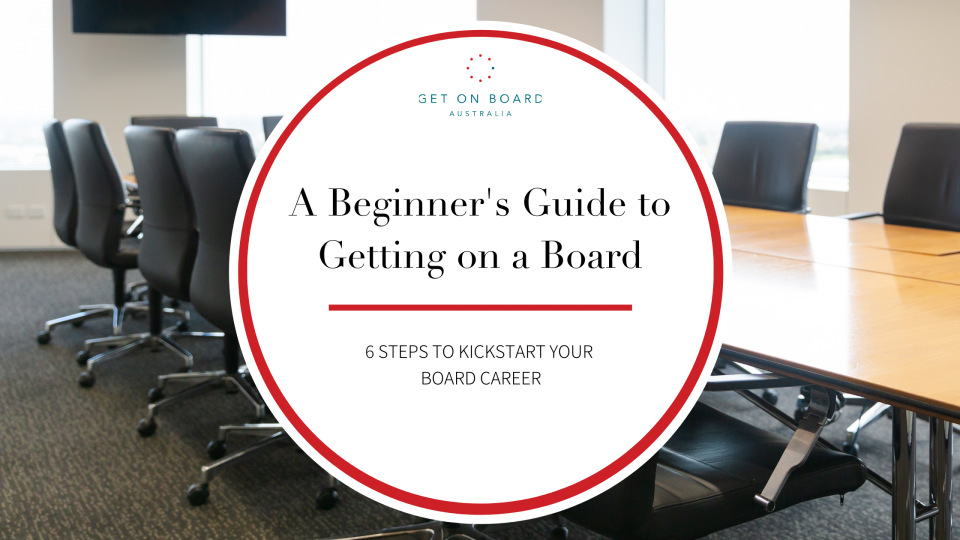Six Steps to Kick-Starting your Board Career

So, you’ve notched up a number of years of experience in your chosen field, you’re on a nice career trajectory, and now you’re looking for that next step. That next opportunity to broaden your experience and skills, build your profile, and start using your expertise to give something back to the world.
You’re ready to join a board.
However, landing a board position isn’t as easy as showing up at a business and asking for “one board seat please”.
To help you score that elusive directorship, we’ve put together a handy to-do list to help you, dare we say, get on board.
1. Be great at your day job
At the beginning of your Board career, the likely reason you will be invited to join a board is because of your area of expertise. If you have worked your butt off and kicked some great goals since starting your career, you will have a better chance of being known and on the right peoples’ radars.
This value that you bring to your organisation is usually the foundation of your unique value proposition and is what you ‘sell’ yourself on to your target boards.
A handy tip is to keep a personal record of your key achievements at work; they are useful for you to use as examples during board interviews, can be added to your LinkedIn profile and CV, and gives you a record to look back as a reminder of all of the great work you have done.
2. Make it known that you are looking for a board role (but not just *any* board role)
Note it on your LinkedIn profile. Mention it to your peers, boss, friends, and professional network. And, leading into point #3, mention it as part of your elevator speech at networking events.
To make your message more compelling, I encourage you to think about the type of board (or boards) that you want to join and why. This will enable you tell people specifically where you want to go and why you’re the right candidate for that board, rather than just “I want to join a board; can you keep me in mind if you hear about any board opportunities?”
If you don’t share that you’re looking to join a board, no one will be able to help you! The board space runs on the network economy, so getting this right is a worthwhile exercise.
3. Network
You probably already network as part of your day job, so you should know what networking is all about and how to do it effectively. Take what you’ve learned there and apply it to yourself. Go to networking events that current board members are attending to find positions that may be open for people with your skill-set and expertise.
Also seek out events that are set up purely for organisations to find potential board members. These are especially useful for finding very worthy not-for-profit organisations where you can ‘cut your teeth’ as a board member. Once you gain your directorship, your network then becomes an important source of skills and expertise that you may need to call upon, either for short-term assistance with a board issue, or for inviting onto a board if a position becomes available.
Here are five tips on networking for a board position.
4. Put together a board CV
When applying for a board position, it helps to upgrade your traditional resume so that it works for your board ambitions. You are now pitching yourself to a higher level within the organisation, and these people want to see different things than a traditional employer would. These include your leadership skills, industry expertise, strategic abilities, and high-level career achievements. Prepare your board resume by enrolling into ‘Five Steps to Build Your Board Resume‘.
5. Create Board Opportunities
Through leveraging board registers, approaching organisations directly, and using board search firms, you can establish a wide source of potential board opportunities that will come to you, rather than having you constantly searching for them.
There are a number of organisations that provide a centralised registry for people who are interested in finding board positions. Organisations use these directories to find suitable potential board candidates. Find our hand-picked registers for you to start with here.
Approaching organisations directly requires a lot of research, due diligence, and tact. If you are ready to boldly create a board opportunity for yourself, this article shares a process that you can adopt for approaching an organisation directly about a potential board opportunity.
Board search firms are always on the lookout for high-quality candidates; at the end of the day, they want to place the best person on the right board. Because of this, board search firms can form part of your overall board search strategy. Here are tips on how to best use board search firms to find board opportunities.
6. Build your Governance Knowledge
You take on a whole range of responsibilities and risks (many of which you don’t even realise!) when becoming a director of a company (AKA a board member). Knowing what these are and how to perform effectively as a director / board member is vital to you having a successful board career. Undertaking professional education and development – such as our Boardroom Bootcamp course – keeps you up to date on the ever-changing governance and business landscapes, builds your confidence, and makes you an asset to the board and organisation.’
Looking for more help getting on a board? Check out Break into the Boardroom, our always-open, self-paced course to help you land your first board role.

1 Comment
Comments are closed.